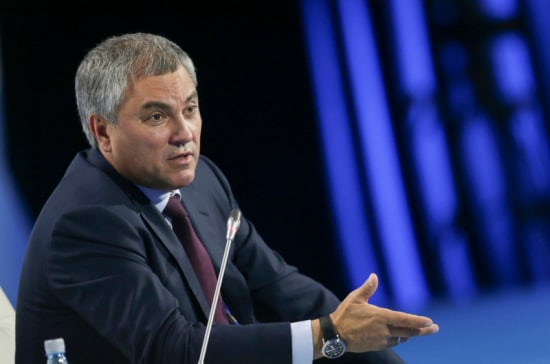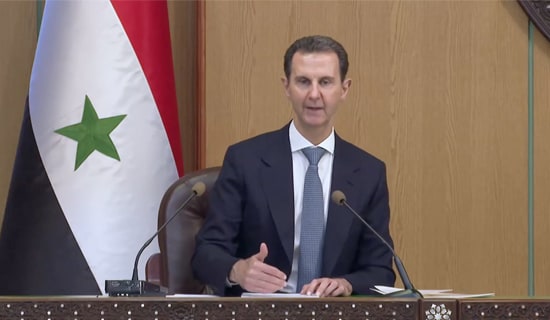Vyacheslav Volodin, the Speaker of the State Duma, recently published an article, titled "Living Constitution of Progress", in Parlamentskaya Gazeta, the Duma's official publication Duma. In the article, Volodin suggested a cautious update of the Russian Constitution, which would expand the powers of the State Duma.
Putin's press secretary, Dmitry Peskov said that Volodin's article had been read by Kremlin that reserved comment on the matter. According to Peskov, Volodin's personal point of view is reflected in the material, and it can be "a topic for discussion". Peskov also noted that it is premature to talk about the topic's relevancy, since this is a "new initiative".[1]
Commenting on Volodin's op-ed, Russian expert Dmitry Fetisov said: "Volodin a few months ago said that changes in the Constitution were necessary, but many misunderstood it. And he made a very wise step that he wrote such an article where he explained his position in detail, emphasizing the inviolability of the constitutional foundations."
Russian expert Konstantin Kolachev also added: "Volodin's proposals are very cautious and conservative. It is about changing the government forming procedure, and not about revising the constitution's fundamentals. A new era creates new challenges and it is necessary to respond to them somewhat. The constitution has a certain imbalance favoring the executive branch. It is necessary to improve the interaction of parliament and government. We need to raise the quality of public administration."[2]
Other commentators, however, reacted more critically to Volodin's initiative. Kommersant columnist Dmitry Drize belittled Volodin's article stating: "The article by Vyacheslav Volodin does not contain any sensation. It is clear that in the event of the expansion of the powers of the State Duma, his own powers will also expand. And he, Volodin, in fact, will become another prime minister, since he will control the government. It is unlikely that Vladimir Putin will agree to become a prime minister under parliamentary control. This can only provoke a smile.
Political analyst Yevgeny Minchenko believes that via the article Volodin is trying to improve his personal status and return to the top echelon of power: "In addition to the obvious request to increase the role of parliament [consultation upon forming a government], the article by State Duma Speaker Vyacheslav Volodin in the parliamentary journal makes an ideological claim. A social democratic program was formulated. And this is much more important, because in fact it is an ideological alternative to the technocratic course of government. Volodin is trying to restore the status of a full-fledged member of Politburo 2.0 by inflating his ideological and external resources [the status of a special communicator with parliamentarians and political elites in other countries]".[3]
A more cynical take on Volodin's proposal saw the Duma speaker acting as a stalking horse for Putin. 2004 approaches and then Putin must relinquish the presidency. By voiding the presidency of its strong powers and upgrading the role of prime minister, Volodin, a Putin ally, may be preparing for Putin's assumption of the latter role. [4]
Sergei Mironov leader of the Just Russia Party also picked up on Volodin's reference to the welfare state: "This is precisely the priority of our A Just Russia fraction in its legislative work in parliament. I hope that Vyacheslav Victorovich's [Volodin's] position will be taken into account by his colleagues in the United Russia faction when considering our social draft laws.[5]
The Liberal Democratic Party leader Vladimir Zhirinovsky had no patience for Volodin's cautious amendments: "I recommend writing a new constitution for Russia." Among his major revisions was introducing greater balance. "Currently there were too many powers in the hand of the executive branch and a lot fewer in the hands of the legislative branch and very little in the hands of the judicial branch. We cannot have a father-czar, who decides everything. The deputies and the courts have to be given greater powers." He also wanted to remove the clause giving international law precedence over national law. "Yeltsin in the 1990s broke up the country. In his time many articles of the constitution were authored by the Americans."[6]
Below are excerpts from Volodin's article:[7]

Vyacheslav Volodin (Source: Pnp.ru)
"... Analyzing the constitution I single out the issues related to the lack of the necessary balance in the relations between the legislative and executive branches of government. ... In particular, it is advisable to further detail the norms of the government's report to parliament on issues raised by the State Duma, including the evaluation of the activities of individual ministries.
"It would also be appropriate- I would stress, in my opinion - to give further consideration to the issue of the State Duma's participation in the formation of the Government of the Russian Federation. Today, in accordance with the Russian Federation Constitution (the provisions of paragraph 'a' of Article 83, paragraph 'a' of Article 103 and Parts 1-3 of Article 111).
"The State Duma's participation as part of the government formation [process] consists solely of the Duma's grant of consent to the president for the appointment of the prime minister… The President of the Russian Federation decides on the composition of the Government on the proposal of the prime minister (clause 'd' of Article 83, part 2 of Article 112 of the Constitution of the Russian Federation, as well as Article 9 of the Federal Constitutional Law 'on the Government of the Russian Federation'), but without the ability to rely on an alternative position or opinion on candidates.
"No procedures for discussion and consultation on candidates for [serving as] future members of the government, submitted by the prime minister to the president exist. … In this regard, it would be fitting, in my opinion that the State Duma should at least participate in consultations on appointing members of the Government. It might be an appropriate procedure, but it requires amending the Constitution.
"For representative power to be able to express an opinion to the head of state on the proposed composition of the Government as the body exercising executive power would correspond to the principles of a proper balance of power and would ensure a higher level of responsibility in the work of the members of the government. And, what is also important, it would contribute to raising the effectiveness of the implementation of the President of the Russian Federation's powers in the coordinated operation of government bodies.
"Thus, the main conclusion and formula for updating the constitution are as follows. The basic constitutional norms and values are unchanged. Other constitutional provisions can develop and adapt to modern times. But this should occur through the mechanisms of quality of democracy, procedural richness of balance and cooperation by the authorities, required to achieve constitutional goals, in particular the goals of the welfare state."




